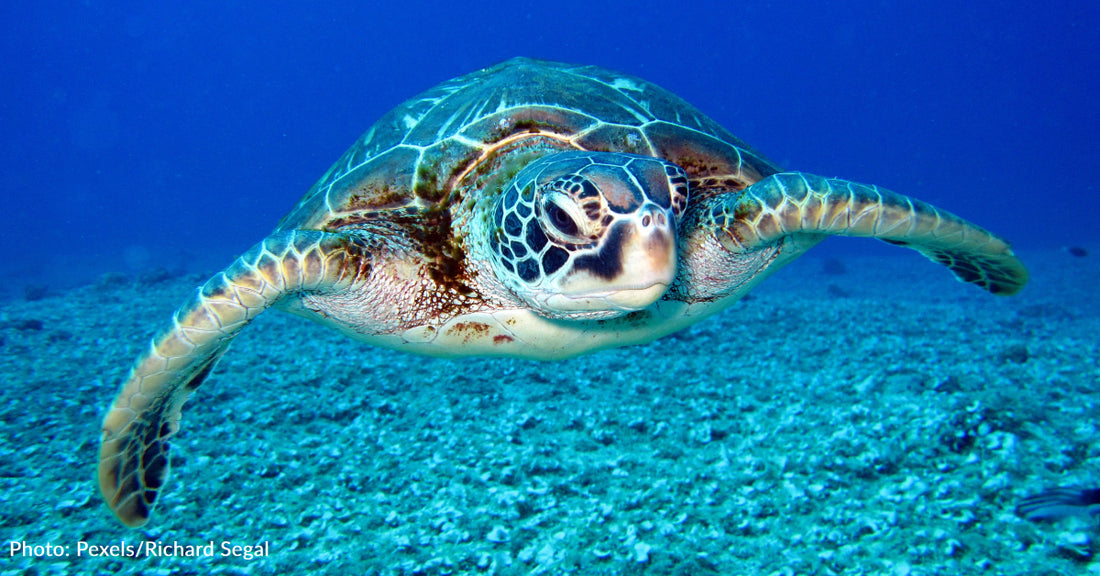10 Interesting Facts About Sea Turtles
Andrea Powell
Turtles are fascinating creatures that date back to prehistoric times. There are over 350 species of turtles that live on land and in water, both salt and fresh water. They range in size and types of shell, but also have a lot in common. They are the epitome of slow but steady.
World Sea Turtle Day is celebrated on June 16 every year to raise awareness of the importance of sea turtles and the threats they face. We decided to dive a little deeper into what makes these reptiles so resilient and found some interesting facts. Check them out below and then see how you can help turtles.
Come in all sizes
The largest sea turtle species is the leatherback turtle that can weigh up to 2000 pounds. The smallest sea turtles weigh under 100 pounds and are also the most endangered species - Kemp's ridley sea turtles.
Longevity
Scientists say it is difficult to determine the exact age of a turtle since they enter the water as a hatchling and then spend decades migrating thousands of miles in the oceans. However, they speculate that sea turtles have life spans similar to humans. Many species live for 70-80 years while others surpass 100 years.
Live all over the world
Turtles are found on every continent, except Antarctica. Sea turtles are highly migratory but are mostly found off the shores of southeastern North America and South Asia. The flatback sea turtle resides off the coasts of Australia.
One of the oldest animals
Turtles lived alongside dinosaurs and are still surviving in the ever-changing world. The National Wildlife Federation (NWF) states, "Sea turtles are among the oldest creatures on Earth and have remained essentially unchanged for 110 million years."
How do they sleep?
Sea turtles spend most of their lives in the water, except to lay eggs, and can even sleep underwater. Sea Turtle Conservancy shared, "Sea turtles can sleep at the surface while in deep water or on the bottom wedged under rocks in nearshore waters. Many divers have seen green turtles sleeping under ledges in reefs and rocks."
Can hold their breath
Since the reptiles live mostly in the water, they can hold their breath for hours when resting. When active and awake during the day they will return to the surface several times an hour to breathe before diving back down to forage for food.
Sea turtles are toothless
Sea turtles do not have any teeth, but that doesn't stop them from eating. Instead NWF states that they use their "powerful jaws to crush, bite, and tear their food." Loggerhead sea turtles are said to have a bite force of more than 500 pounds, which is enough to take off a finger!
Sand temperature determines gender of baby turtles
Sea turtles typically only leave the water to lay eggs in the sand. They use their back flippers to dig a hole in the sand and then lay over 100 eggs. The temperature of the sand will determine the gender of the baby turtles. Warmer sand produces females while colder sand produces males. According to National Oceanic and Atmospheric Administration (NOAA), if the temperature fluctuates then there will be a mix of males and females.
Fascinating, right?!
Sea turtles cannot retract into their shell
Land turtles can take cover inside their shell from a predator, but sea turtles are built a little differently. Their shell is flatter, and their head is fixed to the outside, so they are unable to duck into their shell when afraid. This makes them more vulnerable to predators and fishing gear.
Ocean "lawnmowers"
One species of sea turtle - the green sea turtle - is a vegetarian. The turtle gets its name and color from eating nothing but seagrass and algae. Other sea turtle species will eat seagrass as well as jellyfish, crabs, shrimp, and snails.
Turtles are vital in maintaining healthy marine ecosystems. Sadly, nearly all sea turtle species are listed as threatened or endangered and some are critically endangered. These magnificent marine animals have been swimming in the oceans for millions of years but now face more threats caused by humans. Countless sea turtles are killed each year due to plastic pollution, becoming trapped in fishing gear, overharvesting, and habitat destruction.
Take the plastic bag pledge below and help save turtles and other marine animals from a traumatic death. Click below to make a difference.






